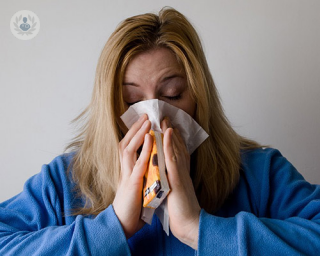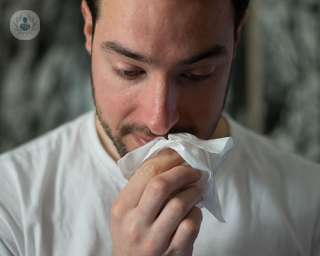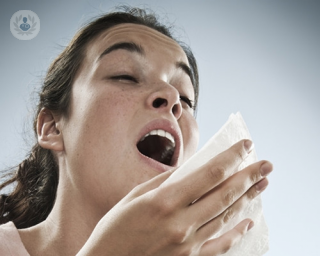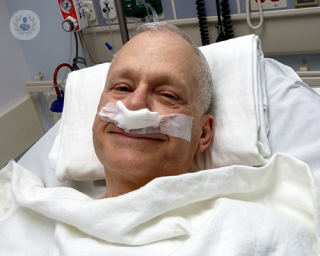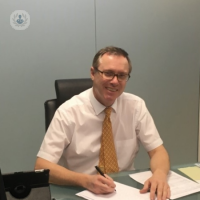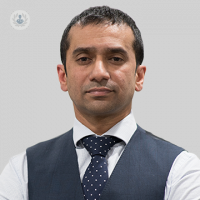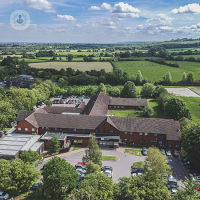Sinusitis
Mr Richard Hewitt - Paediatric otolaryngology
Created on: 11-13-2012
Updated on: 09-26-2023
Edited by: Conor Lynch
What is sinusitis?
Sinusitis is a condition characterised by inflammation of the paranasal sinuses which are the cavities located behind the forehead, cheeks and eyes. It occurs as a result of infection by viruses, fungi or bacteria. Sinusitis can be treated by an ENT specialist.
There are two types of sinusitis:
- Acute sinusitis – when the symptoms are present for four weeks or less. It is caused by bacteria that proliferate in the paranasal sinuses.
- Chronic sinusitis – occurs for more than 12 weeks and the causes can include infection, nasal polyps, or a deviated nasal septum.

What are the main symptoms?
There are a whole host of symptoms that patients suffering from sinusitis will typically suffer from. The main one are as follows:
- bad breath
- loss of sense of smell
- pain and swelling to the cheeks, eyes and forehead
- fever
- headache
- fatigue
- cough (which gets worse at night)
- sore throat
- nasal congestion and nasal discharge
What are the main causes of sinusitis?
The cause of sinusitis is an infection caused by viruses, fungi or bacteria. When the paranasal openings are blocked, bacteria or other microorganisms can easily grow.
Obstruction of the paranasal openings may occur due to:
- the small hairs of the paranasal sinuses not managing to remove the mucus properly
- colds and allergies causing too much production or mucus
- a deviated nasal septum, a nasal bone spur, or nasal polyps.
Can sinusitis be prevented? If so, how can it be?
Yes, sinusitis can certainly be prevented. The best way to prevent sinusitis is to avoid coming down with a cold. If you cannot avoid them, it is important to treat them quickly. Some tips to prevent sinusitis include:
- reduce stress
- wash hands frequently
- avoid smoke and pollutants
- take decongestants during an upper respiratory infection
- use a humidifier to increase the humidity in the nose
What are the different ways it can be treated?
In general, sinusitis heals on its own and self-care can effectively manage the discomfort. If symptoms persist, however, antibiotics can be prescribed.
What are some useful and effective home remedies to help relieve sinusitis symptoms?
There are a handful of things that patients with sinusitis can do at home to help relieve symptoms. Some of the most helpful and effective self-care techniques include:
- resting
- drinking lots of fluids to stay hydrated
- applying a warm compress to your face
- ensuring your nasal passages are drained
- sleeping with your head elevated
- using over-the-counter painkillers to manage any pain
- avoiding smoking
- cleaning your nose with a salt water solution

When should I seek medical attention for sinusitis?
Patients suffering from sinusitis who notice the following should see a specialist as soon as they can:
- severe symptoms
- painkillers are not helping their symptoms
- symptoms are not improving after a week
- they keep suffering from recurrent sinusitis
When would surgery be considered to treat sinusitis?
If the symptoms do not disappear with or after treatment, it may become necessary to perform surgery to enlarge the opening and to drain the sinuses.
Which specialist can deal with and treat sinusitis?
Generally, a GP can treat symptoms displayed by a patient with sinusitis. However, a patient will typically be referred to an ENT (ear, nose, and throat) specialist if the patient is still suffering from sinusitis after three months, and if they only experience sinusitis-related symptoms on one side of the face.
Do I need a prescription to buy nasal sprays, and how long should I use a nasal spray?
Fortunately, you do not require a prescription in order to be able to purchase a nasal spray at your nearest pharmacy. It is recommended that patients using nasal sprays do not use them for more than a week.
What are the main signs of sinusitis in young children?
If you notice that your child is quite irritable, is breathing through their mouth and not their nose, and have difficulty when eating, your child may be suffering from sinusitis.
How is sinusitis treated surgically?
Functional endoscopic sinus surgery (FESS) is the name of the surgical procedure performed when treating sinusitis through surgical means. It is performed under general anaesthetic, and the surgeon performing the surgery will widen the patient's sinuses by either removing a section of the blocked tissue in the nose, or by inflating a very small balloon within the blocked sinuses, and then removing it. Small amounts of bone from the nose are removed, along with any swollen lining of the nose.
What can I expect before functional endoscopic sinus surgery?
If you are scheduled to undergo functional endoscopic sinus surgery, you will be required to undergo a pre-assessment examination prior to surgery. In this examination, you will typically be screened for MRSA and you will have various routine blood tests done, before having an electrocardiogram.
You will not be able to eat any food for six hours prior to coming into hospital for your functional endoscopic sinus surgery, and you shouldn't drink anything for two hours before the operation, apart from clear fluids, such as water, black tea, and black coffee).
How long does functional endoscopic sinus surgery take?
This operation usually lasts anywhere between 30 and 60 minutes.
Is sinusitis contagious?
No, thankfully sinusitis is not a contagious conditon, so cannot be passed on to other people.
Where in the body can the congestion caused by sinusitis be felt?
In most cases, patients often report a feeling of fullness which is mostly felt in the head, neck, jaw, cheeks, eyes, and behind the forehead.
What foods should people with sinusitis avoid?
It is highly recommended that patients with sinusitis stay away from dairy products, such as yoghurt and cheese. Tomatoes, chocolate, gluten, and bananas are all also foods to avoid if you have sinusitis.

